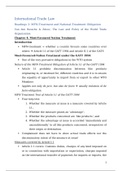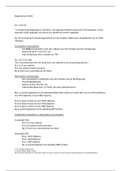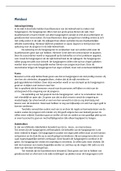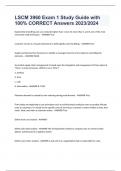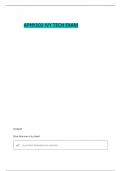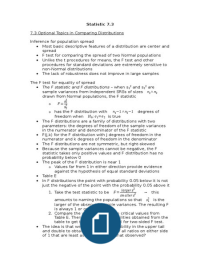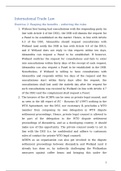Studen
ts
History
The repeated motif of waking up — this appears again
History is dead and ugly, and in stanza six — mimics the cyclical nature of history.
similarly the old woman is a
liminal space between death and There’s an element of surprise in the first line as if her
She woke up old at last, alone,
life. ageing just happened.
bones in a bed, not a tooth
This represents both history and in her head, half dead, shuffled
age; both belong to the past and The long assonant letter “o” in lines one and two have
and limped downstairs a hollow sound, perhaps suggesting horror and
both have a terrible reality.
in the rag of her nightdress, despair.
smelling of pee.
“Bones in bed” is plosive and
alliterative, creating a staccato A depiction of old age and neglect and
effect that adds emphasis. helplessness. The verbs “shuffled” and
“limped” are paired, sounding slow and
The old woman is incontinent, as halting like the movements described. The
is common in old age. She linking of two related words is echoed in the
therefore smells dirty and following stanza by “wheezed and coughed”
decayed. and “dozed, snored”. This device is known as
hendiadys.
It is emphasised by the
enjambed connection with the The demonstrates Duffy’s skilled
next stanza and the rhyming of craftsmanship.
“pee” with “tea”. The colour of
weak tea and urine are
significantly similar.
The first word of the poem chimes ‘She’, instantly establishing the central
theme of the poem: the female perspective. Duffy places the personified
‘History’ as the first thing the reader encounters upon reading the poem, the
disoriented woman waking up ‘alone’. This status of being ‘alone’ reflects how
women’s perspective is often forgotten within histor
This description, coming as the final and shortest line of stanza one, ‘smelling of pee’ is finished by an end
stop. The blunt nature of this description intends to shock the reader, Duffy displaying the natural state
of this woman through a manner that goes against the stereotypes of women. Ugliness and lacking grace
are not something to be shied away from, Duffy putting these qualities at the center of this woman. This
simultaneously dismantles the stereotype, while also suggesting that the woman (representing women’s
perspectives throughout history) is not cared for by society, Duffy demonstrating how women are left
unattended as they grow old.
This gives a vivid picture of the woman’s
This is a contradiction. The physical state. “Slurped tea” is enjambed with
woman, History, appears to be the previous stanza, with “tea” and “pee”
Slurped tea, stared rhyming, two liquids similar in colour.
going out, but doesn’t. She lays on
at her hand--twigs, stained gloves--
the sofa, debilitated. This could
suggest that new energy, an wheezed and coughed, pulled on The woman’s hands as “twigs, stained gloves”
attempt of revival, doesn’t even the coat that hung from a hook is a vivid depiction of age. The paired
begin. Human affairs fail to move on the door, lay on the sofa, “wheezed and coughed” likewise shows
on or progress. There is no life and dozed, snored. physical deterioration.
by implication joy left in the
woman and what she represents. The reader needs to bear in mind the title of
the poem, “History”. Life’s events are so
harrowing and cruel that the old woman and
the history she represents have been left in
this pitiful state.
Studen
ts
, Studen
ts
Duffy rallies against the patriarchal notion that women must be pristine and beautiful, creating a
depiction of a woman who goes against these ideas. Her mouth is ‘tooth[less]’, looking ‘half-dead’ as she
‘limped downstairs’. The use of verbs within these two stanzas, ‘limped’, ‘slurped’, ‘wheezed and
coughed’, ‘dozed, snored’ all further the indelicate and graceless presentation of the woman. Going
against the patriarchal archetype of women, Duffy has created a woman who does not have to look
perfect and beautiful, portraying someone who doesn’t care that they smell ‘of pee’.
In the third stanza Duffy states
clearly the nature of the old She was History.
woman, a capitalised allegorical She’d seen them ease him down
figure who represents the human from the Cross, his mother gasping
perspective on the past. In the for breath, as though his death
context of Duffy’s collection, this was a difficult birth, the soldiers spitting, This is a clear reference to the crucifixion of
figure has to be female, given the spears in the earth; Christ. Duffy presents Jesus being “ease(d)”
neglect suffered by women in the
down from the Cross through the eyes of
study of the progress of human
his mother, Mary, and Mary Magdelene.
events. The sentence’s
This is an important alternative perspective;
conciseness gives it emphasis; an
most paintings of the crucifixion in which
attempt to redress this
These stanzas begin with the phrase the women appear show figures that the
imbalance. It is followed by a
‘She was History’, the short sentence viewer sees as passive, distressed observers
caesura, a break which
contrasting the following lengthy at the foot of the cross. In this stanza she is
emphasises the drama.
descriptions of moments in history. an active participant in the drama.
It has been commented that the Duffy’s use of a short sentence creates
a blunt line, furthered by the use of an The"difficult birth" simile is something that
noun “history” can be
probably only a woman poet would think
represented as “his story”. This is end stop. These poetic techniques
of. The reference to death and birth is
apt as history has been written by culminate in a bold depiction of the
significant also because of the cyclical
and about men — hence the woman, the grandeur of ‘History’
nature of history — the endless repetition
possessive determiner “his”. being attributed to the equally impressive
— of tragic events from which nothing is
However, the word “history” ‘She’ – both being capitalized in this short learned.
derives from the ancient Greek sentence.
for learn or find out. The related
The callous indifference of the soldiers is
noun is “histor” meaning wise or
conveyed in the “soldiers spitting spears”,
learned person.
with its hard, sibilant alliterative “s"s and
plosive "p"s and "t"s. The male role is brutal
and heartless compared to the grieving
mother who is "gasping for breath”.
Studen
ts
ts
History
The repeated motif of waking up — this appears again
History is dead and ugly, and in stanza six — mimics the cyclical nature of history.
similarly the old woman is a
liminal space between death and There’s an element of surprise in the first line as if her
She woke up old at last, alone,
life. ageing just happened.
bones in a bed, not a tooth
This represents both history and in her head, half dead, shuffled
age; both belong to the past and The long assonant letter “o” in lines one and two have
and limped downstairs a hollow sound, perhaps suggesting horror and
both have a terrible reality.
in the rag of her nightdress, despair.
smelling of pee.
“Bones in bed” is plosive and
alliterative, creating a staccato A depiction of old age and neglect and
effect that adds emphasis. helplessness. The verbs “shuffled” and
“limped” are paired, sounding slow and
The old woman is incontinent, as halting like the movements described. The
is common in old age. She linking of two related words is echoed in the
therefore smells dirty and following stanza by “wheezed and coughed”
decayed. and “dozed, snored”. This device is known as
hendiadys.
It is emphasised by the
enjambed connection with the The demonstrates Duffy’s skilled
next stanza and the rhyming of craftsmanship.
“pee” with “tea”. The colour of
weak tea and urine are
significantly similar.
The first word of the poem chimes ‘She’, instantly establishing the central
theme of the poem: the female perspective. Duffy places the personified
‘History’ as the first thing the reader encounters upon reading the poem, the
disoriented woman waking up ‘alone’. This status of being ‘alone’ reflects how
women’s perspective is often forgotten within histor
This description, coming as the final and shortest line of stanza one, ‘smelling of pee’ is finished by an end
stop. The blunt nature of this description intends to shock the reader, Duffy displaying the natural state
of this woman through a manner that goes against the stereotypes of women. Ugliness and lacking grace
are not something to be shied away from, Duffy putting these qualities at the center of this woman. This
simultaneously dismantles the stereotype, while also suggesting that the woman (representing women’s
perspectives throughout history) is not cared for by society, Duffy demonstrating how women are left
unattended as they grow old.
This gives a vivid picture of the woman’s
This is a contradiction. The physical state. “Slurped tea” is enjambed with
woman, History, appears to be the previous stanza, with “tea” and “pee”
Slurped tea, stared rhyming, two liquids similar in colour.
going out, but doesn’t. She lays on
at her hand--twigs, stained gloves--
the sofa, debilitated. This could
suggest that new energy, an wheezed and coughed, pulled on The woman’s hands as “twigs, stained gloves”
attempt of revival, doesn’t even the coat that hung from a hook is a vivid depiction of age. The paired
begin. Human affairs fail to move on the door, lay on the sofa, “wheezed and coughed” likewise shows
on or progress. There is no life and dozed, snored. physical deterioration.
by implication joy left in the
woman and what she represents. The reader needs to bear in mind the title of
the poem, “History”. Life’s events are so
harrowing and cruel that the old woman and
the history she represents have been left in
this pitiful state.
Studen
ts
, Studen
ts
Duffy rallies against the patriarchal notion that women must be pristine and beautiful, creating a
depiction of a woman who goes against these ideas. Her mouth is ‘tooth[less]’, looking ‘half-dead’ as she
‘limped downstairs’. The use of verbs within these two stanzas, ‘limped’, ‘slurped’, ‘wheezed and
coughed’, ‘dozed, snored’ all further the indelicate and graceless presentation of the woman. Going
against the patriarchal archetype of women, Duffy has created a woman who does not have to look
perfect and beautiful, portraying someone who doesn’t care that they smell ‘of pee’.
In the third stanza Duffy states
clearly the nature of the old She was History.
woman, a capitalised allegorical She’d seen them ease him down
figure who represents the human from the Cross, his mother gasping
perspective on the past. In the for breath, as though his death
context of Duffy’s collection, this was a difficult birth, the soldiers spitting, This is a clear reference to the crucifixion of
figure has to be female, given the spears in the earth; Christ. Duffy presents Jesus being “ease(d)”
neglect suffered by women in the
down from the Cross through the eyes of
study of the progress of human
his mother, Mary, and Mary Magdelene.
events. The sentence’s
This is an important alternative perspective;
conciseness gives it emphasis; an
most paintings of the crucifixion in which
attempt to redress this
These stanzas begin with the phrase the women appear show figures that the
imbalance. It is followed by a
‘She was History’, the short sentence viewer sees as passive, distressed observers
caesura, a break which
contrasting the following lengthy at the foot of the cross. In this stanza she is
emphasises the drama.
descriptions of moments in history. an active participant in the drama.
It has been commented that the Duffy’s use of a short sentence creates
a blunt line, furthered by the use of an The"difficult birth" simile is something that
noun “history” can be
probably only a woman poet would think
represented as “his story”. This is end stop. These poetic techniques
of. The reference to death and birth is
apt as history has been written by culminate in a bold depiction of the
significant also because of the cyclical
and about men — hence the woman, the grandeur of ‘History’
nature of history — the endless repetition
possessive determiner “his”. being attributed to the equally impressive
— of tragic events from which nothing is
However, the word “history” ‘She’ – both being capitalized in this short learned.
derives from the ancient Greek sentence.
for learn or find out. The related
The callous indifference of the soldiers is
noun is “histor” meaning wise or
conveyed in the “soldiers spitting spears”,
learned person.
with its hard, sibilant alliterative “s"s and
plosive "p"s and "t"s. The male role is brutal
and heartless compared to the grieving
mother who is "gasping for breath”.
Studen
ts


